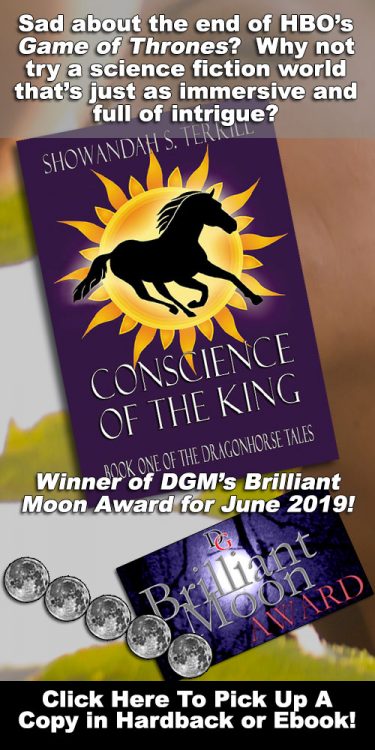If you’re just tuning into our interview series with Greywalker creator and author, Kat Richardson, you’ll probably want to start with the first part of this five part series here, where we covered the basics of the series and the new upcoming novel, Possession.
As we continue our interview, we discuss with Ms. Richardson what writing routine she follows in order to be able to generate so profuse a collection of literature in this series.
Writing Routine.

Kat Richardson creates a high amount of content and, in this interview, we find out how she stays on the wheel to pull it off!
Ok. I’m finally done laughing from the last part of our interview where you were commenting on your feet, so let’s move on to another topic.
You’ve been generating over a book a year since you first got published by my count, so what routine do you follow to make that happen?
I’m a silent writer for the most part and I work on a laptop at a project table in my office, not at a stand up desk or sitting in an arm chair in the living room–I have to have the “work” feeling or I don’t get it done. I don’t listen to much music or watch TV or have things running in the background while I work. I’ve never had the knack of “casting” the books or creating soundtracks, although I have created play lists when I was having difficulty with getting the feel of a setting or scene. Then music helps, but only instrumental. If it has lyrics, I’ll listen instead of letting it just be background noise.
Deadlines and paying the bills are my biggest motivators. I’m actually a lazy, procrastinating slug, but it’s a job and once I get an idea cooking, I know it has to be whipped into shape by a certain date or I’m going to be in big trouble. I started out in print journalism–in fact my degree is in Magazine Editing–and one thing I learned from it was how to schedule backward. Look at the deadline and then look at the process time it takes to get the work done. Set the start date by working backward from the end date. Then add twenty percent, because shit happens. Also… lazy slug-ness happens. Some days things don’t get done and I have to make up for it later. In general, I have research going on about a year or two in advance in increasingly focused ways until about six months before a first-draft deadline and that’s when I start working on outlines and putting pieces together. I make files on my computer and bookmark a lot of websites. I also read a lot on the topics I want to hit. I know my “serious writing” speed is around 2,000 words per day so I can do about 10,000 words a week if I work Monday through Friday. I treat it like a job. I sit down with a goal of 10,000 to 12,500 words per week and I just… write Monday through Friday. If I’m ahead, that’s great, but I’m almost always behind because I get side tracked or something that worked in the outline is totally broken when the story is becoming words and I end up having to remodel it and fix things on the fly. Upon occasion I run about a week late, but I’ve never missed a deadline and I’m ridiculously pleased that I now have a reputation for being reliable, professional, and easy to work with–it makes it that much more impressive when I put my foot down over something, so when I say “absolutely not” to a suggestion, they take me seriously. I call it “playing a Diva card,” and I figure every author has 0.6 Diva cards per project, which means… you’d better use them with care.
With short stories it actually takes me more time per word to write–a 7,000 word short story takes about 10 days rather than the 3 or 4 you might imagine since they must be much more economical than a novel and that means thinking much harder and doing a lot more pruning and revising during the first draft stage. They also have to come from an idea that’s the right size, which means a lot of thinking, rejecting, and planning before I start writing a short or a novella, or… whatever.
Actually, I can completely understand that. Coming from an Indie film background the way you focus things for a short script is very different than for a feature film script. The writing can be much more agonizing. The main difference is that, for everything else in production, the short film is much easier to create, usually. Unless you try to completely remodel your film in post–and then a short film can easily usurp a feature, but I digress. Please, carry on!
See: that’s where film and writing have a strange sort of analog. There’s a revision and a copyedit and a proofreading stage for everything–you call it Post-Production and we call it a Revision Cycle.
I also send work in progress out to a small group of readers–usually at the same time I send it to my editor and agent–and I go through all the notes from all sources in the revision cycles, which take anywhere from ten days for proofs to six weeks for novel revisions. I guess that would be kind of like Rushes or Dailies. You show your work and get feedback. In my case, it usually takes a few weeks to get all those notes back, so the process of writing and revising, copyediting and proofing takes about eight months beyond the research and outline stage. Obviously projects overlap a bit. And they always overlap with promotion and book tours–if there are any. For instance, I’m working on the outline and rough draft for Greywalker #9 (REVENANT) and writing another book on-spec right now, even though Greywalker #8 will be out in a few weeks. Because a writer has to think about a year to two years ahead in terms of contracts and schedules.
I know it’s not an exciting or glamorous process, but it gets the job done and no matter how much I love what I do–and I do love it a lot–it’s a lot of work. It’s a job. The best job you’ll ever be severely underpaid for and keep doing anyway.
A lot of our readers are very interested in writing and hearing tales “from the grid,” so to speak, is extremely interesting to many of them. And it’s a great point how much work you’re actually putting into what you love; as I’ve run into a lot of very creative people that think that being employed to be creative would be “so organic and easy,” whereas the reality is far different!
Sadly, that’s the heartbreaking thing about creative endeavors–they’re labors of love and like any great love affair, they aren’t perfectly spontaneous and easy. That’s why they call it a “labor” of love.
Too true. Too true!

The Seattle Mystery Bookshop is one Kat works with for special versions of her books and maybe the inspiration for Old Possums.
Thank you so much for coming in and sharing with us, Kat. In our next interview, we’ll chat about some of the colorful secrets you’ve hidden inside your books and give our readers an inside track! Before we adjourn for today, would you mind sharing again where our readers can find out more about Greywalker, Kat?
If your readers want to know more about Harper, they can always visit my own website or FaceBook page and I believe there’s a fan-maintained Wiki about the Greywalker series too.

